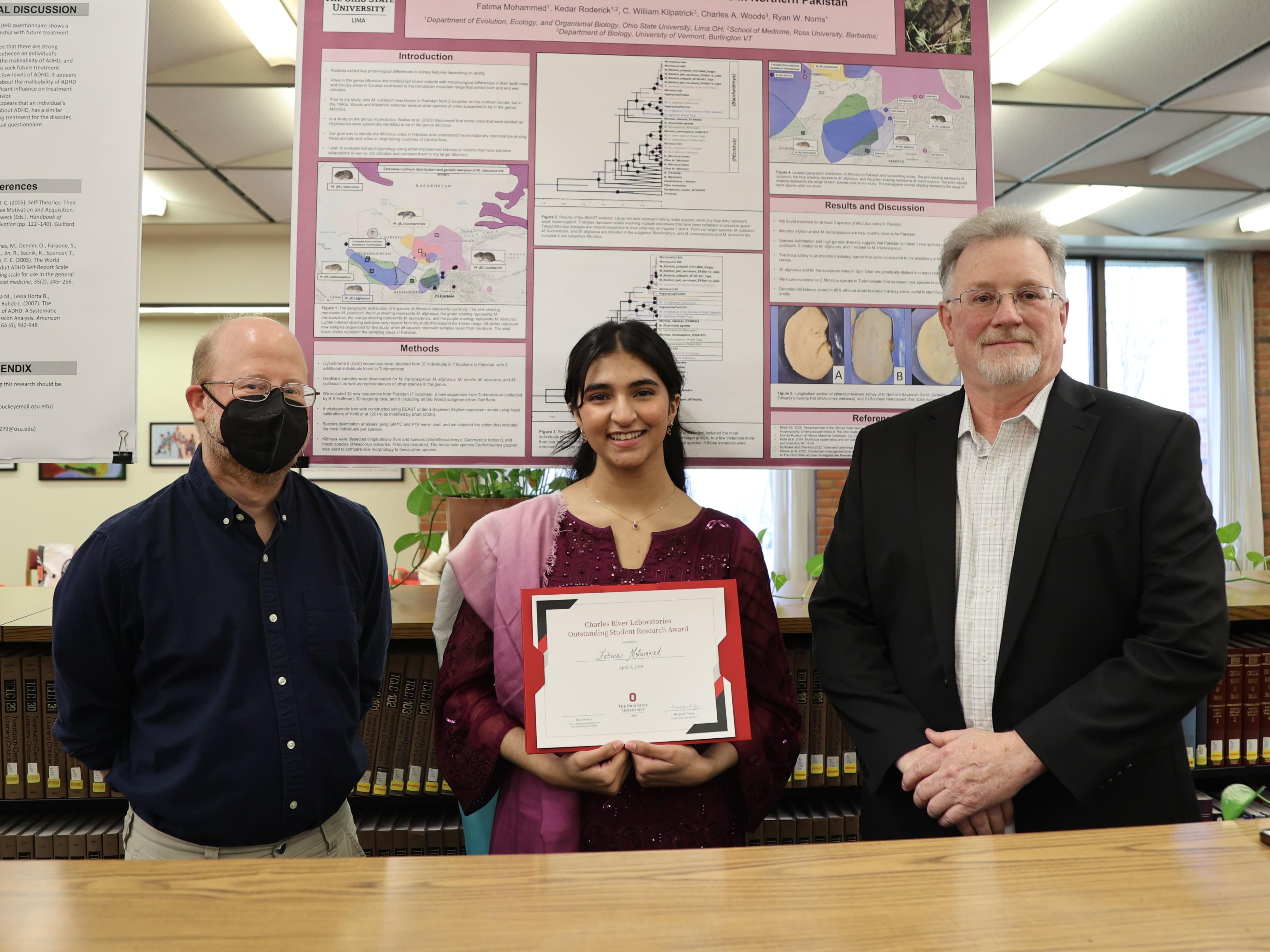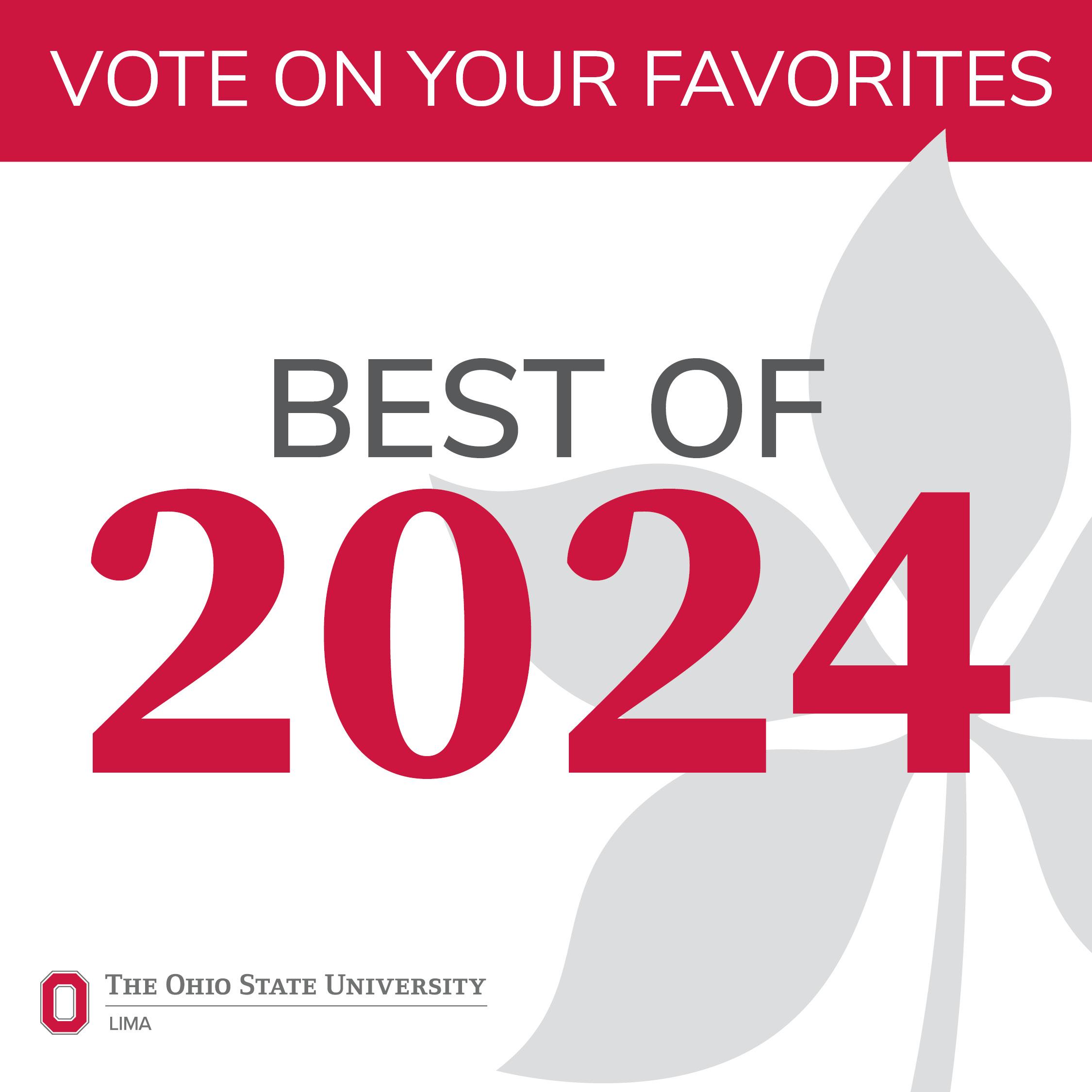When Fatima Mohammed decided to try undergraduate research her sophomore year at Ohio State Lima, she thought it would be interesting and would look good on her resume. It would be one project and done.
Then she discovered how fun and rewarding research could be. She has now presented the findings from her ongoing research at two Undergraduate Research Forums and the International Mammalogical Congress. She will finish her undergraduate research career with a thesis she will work on over the summer before graduation.
“I did the first year and I was addicted. Once you put your foot in the water, you realize just how much there is and then you're either terrified of doing it all or you just want to do it all,” Mohammed said. “Research to me was definitely one of the most challenging things I've ever done but also one of the easiest things I've ever done because you learn more as you keep doing it. As I kept doing it, it became easier because I had confidence that I could do it.”
In recognition of her work on her projects and in the larger Ohio State Lima research community, Mohammed was named the inaugural Charles River Labs Outstanding Student Researcher at the 2024 Undergraduate Research Forum.
A large part of her successful nomination involved the work she has done peer mentoring less experienced lab members, several of whom she recruited to study in Dr. Ryan Norris’ lab. She also spent time at student panels for both prospective students and future researchers talking about her excitement with research and the opportunities it presents.
“Fatima may be the current student leader of and face of research on the Lima campus,” Dr. Norris said. “She has been a big player in the academic enrichment events, including her presence, participation, and our use of her past materials as samples. She has served a critical role in my ability to run a lab with so many students. She came in over spring break and weekends. Sometimes it seemed that she was largely coming just because she could help the junior members at that time. I could not have successfully had so many students present posters without her.”
Mohammed has been studying how one mountain range in Pakistan has produced multiple, genetically-distinct species of voles. While the little rodents were small, the ideas they inspired were big.
“A lot of times when we learn about genetics and evolution, we're thinking millions and millions of years, like it's already happened and we're just catching up. But it's actually happening every single day of our lives,” Mohammed said. “I could look at these voles and even if they're just rodents or whatever, it's still science. It's still evolution that I'm seeing and it kind of gave me chills when I thought about it, just to see change.”
Mohammed has picked up many skills through her research work that will serve her well as she works her way through planned medical school. Time management is at the top of her list. As someone who likes to be right and sure about all things, accepting that there are unknowns in the world as in research will also smooth the way for her.
“When it comes to research, you're dealing with data and DNA that may have been gathered decades ago so there are going to be things that are wrong. There are going to be things where you look at it and think, ‘Okay, that doesn't fit right. It doesn't go with what I thought, but it is what it is, and I just kind of have to go with it,’” Mohammed said. “I feel like it got me comfortable with the fact that I can be wrong and that is okay.”
Mohammed is a middle child. She has older brothers who helped her and a younger who looks to her for similar support. The idea of helping those following you has informed her work during college and will extend to her future career.
“I took it as my job to help those if they didn't understand something because if I can, why shouldn't I? And that's been my mentality ever since I was growing up. That's also why I'm trying to become a doctor. If I can learn how the body works, master that, then I have the knowledge that somebody else does not and I can give it to them. That is literally the coolest thing to me.”
Throughout her time at Ohio State Lima, Mohammed has been a learning center tutor, working in calculus, chemistry, biochemistry, biology, anatomy and physics. She has also worked as a medical scribe at a local ER. Seeing the doctors try to meet the patients at the patients’ level of understanding and also helping her tutoring clients from their individual starting points has paralleled her peer mentoring in the Norris research lab.
“I had to learn how to explain something at their level in research,” she said. “That could be the hard thing, because you don't always realize something is easy for you until you explain it to somebody who doesn't think it's easy.”
While helping her fellow students understand the many topics she tutored in and the research process, Mohammed learned to be a teacher. She had to learn that not everyone learns the same way she does. Taking a step back to find the best way to help others understand a topic has made her a stronger learner and a stronger teacher.
“I had to kind of use different parts of my brain to learn different things and how to do them. And I feel like that helped in many cases in my life, especially in school and research.”
While Mohammed’s current plans don’t include active research, she will be an invested research consumer and will definitely be applying all the skills and standards she has developed in her own projects to the medical research she uses as a future physician.
Mohammed is proud of what she has accomplished and ready for her next step.
“I'm really glad I came here. I feel like I've gotten so much support and I have learned so much, just so much about people actually,” she said. “College was -- a lot of it was me learning about me -- but a lot of it was also just me learning about other people and their experiences, because the world is not just me.”

